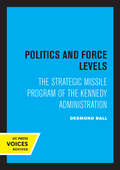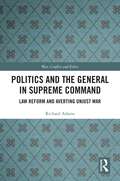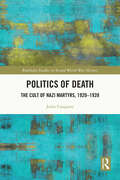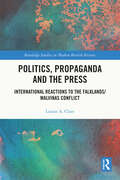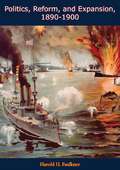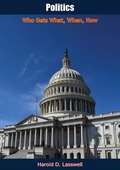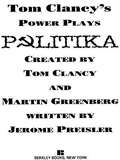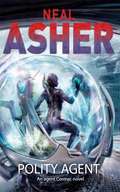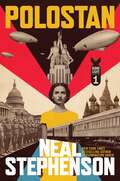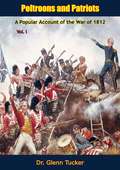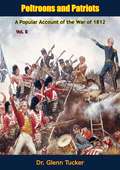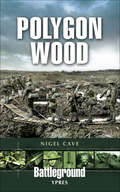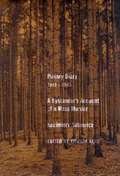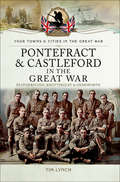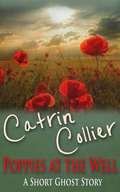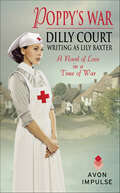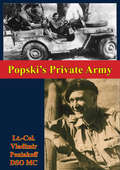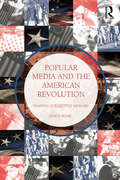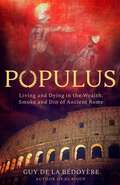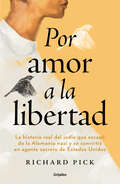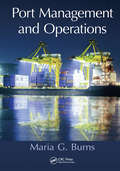- Table View
- List View
Politics and Force Levels: The Strategic Missile Program of the Kennedy Administration
by Desmond BallThis title is part of UC Press's Voices Revived program, which commemorates University of California Press’s mission to seek out and cultivate the brightest minds and give them voice, reach, and impact. Drawing on a backlist dating to 1893, Voices Revived makes high-quality, peer-reviewed scholarship accessible once again using print-on-demand technology. This title was originally published in 1980.
Politics and the General in Supreme Command: Law Reform and Averting Unjust War (War, Conflict and Ethics)
by Richard AdamsThis book argues for reform of the convention that, when politicians decide on a course of action, the general in supreme command obeys without question.The entire spread‑out chain of command is unified in the general, who offers the only connection between the military and politics. Offering the sole connection between the military and politics, only the general can turn political directions into military command and capacitate war. Thus, the general has unique opportunity to resist unconscionable direction to launch an unjust war or to conduct or expand war unjustly. This book argues for reform, so the general has the right in law to refuse direction which is lawful, but awful. The legal capacity to refuse would mean the general would be expected to act responsibly, not merely as the unresisting pawn of politics. Such reform, creating legal opportunity for the supreme command to refuse lawful but unconscionable directives, might avert unjust war.This book will be of much interest to students of the ethics of war, civil‑military relations, and international relations.
Politics of Command
by John Nelson RickardIn December 1943, Lieutenant-General A.G.L. McNaughton resigned from command of the 1st Canadian Army amidst criticism of his poor generalship and of his abrasive personality. Despite McNaughton's importance to the Canadian Army during the first four years of the Second World War, little has been written about the man himself or the circumstances of his resignation.In The Politics of Command, the first full-length study of the subject since 1969, John Nelson Rickard analyzes McNaughton's performance during exercise SPARTAN in March 1943 and assesses his relationships with key figures such as Sir Alan F. Brooke, Bernard Paget, and Harry Crerar. This detailed re-examination of McNaughton's command argues that the long-accepted reasons for his relief of duty require extensive modification.Based on a wide range of sources, The Politics of Command will redefine how military historians and all Canadians look not only at "Andy" McNaughton, but the Canadian Army as well.
Politics of Death: The Cult of Nazi Martyrs, 1920-1939 (Routledge Studies in Second World War History)
by Jesús CasqueteTo disentangle the National Socialists’ path to power in Germany, one must attend to the discursive strategies and liturgical practices employed by its emocrats, or manipulators of emotions. The apotheosis of martyrdom in the National Socialist propaganda template is far from being a marginal element in the movement’s history. Owing to its mobilising and unifying potential in constructing a community of memory, the glorification of Nazi martyrdom constituted a fundamental pillar of the movement’s communicative and propaganda strategy, stressed to the point of paroxysm. The propaganda and lies that ground the construction of the martyr as a prefiguration of the "new man" are the core ideas that form the backbone of this book. The Nazis’ politics of death was a carefully managed element of National Socialism from its very inception. The martyrs, and their blood sacrificed on the altar of the fatherland, were an invaluable propaganda weapon. There were three pillars of the Nazi martyrdom frame: sublimation of death, posthumous sugar-coating and "tamed" death. Once the Nazi movement had taken control of German state apparatus, the mechanisms for disseminating the exemplary martyr in society may have changed, but not the specifics of the propaganda strategy itself.
Politics, Propaganda and the Press: International Reactions to the Falklands/Malvinas Conflict (Routledge Studies in Modern British History)
by Louise A. ClareThis book examines British and Argentine media output in the prelude to and during the 1982 Falklands/Malvinas Conflict and acknowledges the aftermath and legacies of the media response. Yards of ink have been spilt, reinforcing the view that the Argentine Junta’s action on 2nd April 1982 was a ‘diversion’ from domestic tensions. This view, coupled with the paucity of any thorough, in-depth analysis afforded to Argentine media aspects of the War - particularly the press - necessitates this volume’s copious international study of the Conflict. Uniquely, US media output is also analysed alongside Britain’s and Argentina’s, all drawing upon Cold War historiography and media theory, with a view to contesting the traditional consensus that media outlets merely reflected government opinion during the Crisis, providing almost no effective dissent. Asserting media and culture influenced the climatic decision-making process of key actors in the Conflict, this book’s triangulated approach explores the integral, influencing role played therein by culture, and how it was not only instrumental to government actions, but also to Argentine, British and US media output. This book’s revisionist approach makes it a reference point for any nascent research on Falklands/Malvinas media reporting and Argentine and international approaches—particularly the US—to the 1982 Conflict.
Politics, Reform, and Expansion, 1890-1900: 1890-1900 (New American Nation Ser.)
by Harold U. FaulknerIn this present volume, one of a long series of studies in American history, Professor Faulkner deals almost exclusively with the years 1890 to 1900. He discusses the politics of the decade; the economic history of the period; efforts to reform and improve many areas of the existing society; and explores the new burst of territorial expansion resulting in part from the Spanish-American War.“In this balanced and sensible book, Professor Faulkner treats the decade in its full variety.”—G.T. BLODGETT, The New England Quarterly“The straightforward organization and clear writing, as well as the careful footnotes and twenty-three page bibliographical essay, will be boons to the scholars and students who will long be using this volume.”—The South Atlantic Quarterly“This is in the main a scholarly, carefully documented, judicious review of the last decade of the nineteenth century...this volume has one merit so conspicuous that it reduces criticism of the work almost to caviling. This is its analysis of the spirit of expansionism that resulted in our acquisition of Puerto Rico, Hawaii and the Philippines....“Mr. Faulkner is no propagandist. His language is always careful and restrained, but neither is he a historian of the neuter gender. He has opinions and he states them, without extravagance, but equally without ambiguity.”—GERALD W. JOHNSON
Politics: Who Gets What, When, How
by Harold D. LasswellPolitics: Who Gets What, When, How, which was first published in 1936, is the classic analysis of power and manipulation by ruling elites and counter-elites. The themes that occur throughout this essay have become the guideposts for most modern research in techniques of propaganda and political organization.“It is unquestionably one of the most influential treatments of politics published in this century.”—David B. Truman, Prof.of Public Law and Government, Columbia University“This book is a landmark of modern political science.”—Daniel Lerner, Professor of Sociology, M.I.T.“For over three decades the students of politics have had their intellectual horizons constantly broadened by Harold Lasswell. There is probably no man in American political science who has brought to bear as many new approaches to the analysis of political behaviour as he has. There is perhaps no better way to get the essence of Lasswell’s thought than in his book, Politics: Who Gets What, When, How.”—Seymour Martin Lipset, Department of Sociology, U.C. Berkeley
Politika (Tom Clancy's Power Plays #1)
by Tom Clancy Martin H. Greenberg Jerome PreislerIt is 1999. <P> The sudden death of Russia's president has thrown the Russian Federation into chaos. Devastating crop failures have left millions in the grip of famine, and an uprising seems inevitable. <P> One of Russia's provisional leaders asks the American president for help. But the whole world is watching when a deadly terrorist attack stuns the United States and evidence points to the Russian government. <P> Amidst the turmoil in Russia, American businessman Roger Gordian finds his multinational corporation and its employees in jeopardy. Determined to find those responsible for the attack, he calls upon his crisis control team to interven. But Gordian doesn't realize how far the terrorists will go and how much he has to lose...
Polity Agent
by Neal AsherFrom 800 years in the future, a runcible gate is opened into the Polity and those coming through it have been sent specially to take the alien 'Maker' back to its home civilization in the Small Magellanic cloud. Once these refugees are safely through, the gate itself is rapidly shut down - because something alien is pursuing them. The gate is then dumped into a nearby sun. From those refugees who get through, agent Cormac learns that the Maker civilization has been destroyed by pernicious virus known as the Jain technology. This, of course, raised questions: why was Dragon, a massive biocontruct of the Makers, really sent to the Polity; why did a Jain node suddenly end up in the hands of someone who could do the most damage with it? Meanwhile an entity called the Legate is distributing pernicious Jain nodes . . . and a renegade attack ship, The King of Hearts, has encountered something very nasty outside the Polity itself.
Polostan: Volume One of Bomb Light (Bomb Light #1)
by Neal StephensonFrom the #1 New York Times bestselling author of Termination Shock and Cryptonomicon, the first installment in a monumental new series—an expansive historical epic of intrigue and international espionage, presaging the dawn of the Atomic Age.The first installment in Neal Stephenson’s Bomb Light cycle, Polostan follows the early life of the enigmatic Dawn Rae Bjornberg. Born in the American West to a clan of cowboy anarchists, Dawn is raised in Leningrad after the Russian Revolution by her Russian father, a party line Leninist who re-christens her Aurora. She spends her early years in Russia but then grows up as a teenager in Montana, before being drawn into gunrunning and revolution in the streets of Washington, D.C., during the depths of the Great Depression. When a surprising revelation about her past puts her in the crosshairs of U.S. authorities, Dawn returns to Russia, where she is groomed as a spy by the organization that later becomes the KGB.Set against the turbulent decades of the early twentieth century, Polostan is an inventive, richly detailed, and deeply entertaining historical epic, and the start of a captivating new series from Neal Stephenson.
Poltroons and Patriots: A Popular Account of the War of 1812, Vol. I (Poltroons and Patriots #1)
by Dr Glenn TuckerAuthor Glenn Tucker’s interest in research on the War of 1812 was piqued whilst he was employed as a newspaperman in Washington, D.C.“I wanted to find out what truly occurred when the British occupied the American capital in 1814. Nothing like Ross’s seizure of the capital of a great power with a small attacking force has happened elsewhere in modern times. No other event gives so clear a view of the trials of our young government. Searching out the details of Ross’s conquest, I found them gripping, but meagerly reported and often with a farcical touch. Often the incidents, which many have regarded as humiliating and have wished forgotten, abound in human interest and pointed lesson.“The interest and significance of the story of the Ross expedition led me to the story of the entire war. Study of the war as a whole revealed strong contrast of cowardice and courage. I have been amazed by the poltroonery and incompetence of some of the generals and cabinet members; I have been stirred by the patriotic devotion of James Monroe, by the flashing genius of Henry Clay, by the patience and true greatness of James Madison. And I discovered that not only men of high position played exciting roles in the war. Soldiers, seamen, newsmen, couriers and many others, whose names are now obscure, played brilliant, if brief, scenes—some comic, some adventurous, some tragic.“The course of the War of 1812, like that of all wars, was determined as much by emotion as by economic and political pressures. Men acted and reacted violently, passionately. Today the wisdom and courage of some of their deeds evoke tremendous respect; the foolhardiness of others evokes laughter. Throughout these volumes I have made an effort to discern the thoughts and feelings of the people whose actions wove the variegated pattern of the war.”
Poltroons and Patriots: A Popular Account of the War of 1812, Vol. II (Poltroons and Patriots #2)
by Dr Glenn TuckerAuthor Glenn Tucker’s interest in research on the War of 1812 was piqued whilst he was employed as a newspaperman in Washington, D.C.“I wanted to find out what truly occurred when the British occupied the American capital in 1814. Nothing like Ross’s seizure of the capital of a great power with a small attacking force has happened elsewhere in modern times. No other event gives so clear a view of the trials of our young government. Searching out the details of Ross’s conquest, I found them gripping, but meagerly reported and often with a farcical touch. Often the incidents, which many have regarded as humiliating and have wished forgotten, abound in human interest and pointed lesson.“The interest and significance of the story of the Ross expedition led me to the story of the entire war. Study of the war as a whole revealed strong contrast of cowardice and courage. I have been amazed by the poltroonery and incompetence of some of the generals and cabinet members; I have been stirred by the patriotic devotion of James Monroe, by the flashing genius of Henry Clay, by the patience and true greatness of James Madison. And I discovered that not only men of high position played exciting roles in the war. Soldiers, seamen, newsmen, couriers and many others, whose names are now obscure, played brilliant, if brief, scenes—some comic, some adventurous, some tragic.“The course of the War of 1812, like that of all wars, was determined as much by emotion as by economic and political pressures. Men acted and reacted violently, passionately. Today the wisdom and courage of some of their deeds evoke tremendous respect; the foolhardiness of others evokes laughter. Throughout these volumes I have made an effort to discern the thoughts and feelings of the people whose actions wove the variegated pattern of the war.”
Polygon Wood (Battleground Ypres)
by Nigel CaveThis wood featured significantly in the First and Third Battles of Ypres and was the scene of numerous deeds of heroism, such as that which won young Lieutenant-Colonel Philip Bent the VC. The courage of individuals and units from Britain and Australia is described in this latest edition to the series covering Ypres.
Ponary Diary, 1941-1943: A Bystander's Account of a Mass Murder
by Kazimierz Sakowicz Yitzhak Arad Laurence WeinbaumAbout sixty thousand Jews from Wilno (Vilnius, Jewish Vilna) and surrounding townships in present-day Lithuania were murdered by the Nazis and their Lithuanian collaborators in huge pits on the outskirts of Ponary. Over a period of several years, Kazimierz Sakowicz, a Polish journalist who lived in the village of Ponary, was an eyewitness to the murder of these Jews as well as to the murders of thousands of non-Jews on an almost daily basis. He chronicled these events in a diary that he kept at great personal risk. Written as a simple account of what Sakowicz witnessed, the diary is devoid of personal involvement or identification with the victims. It is thus a unique document: testimony from a bystander, an "objective" observer without an emotional or a political agenda, to the extermination of the Jews of the city known as "the Jerusalem of Lithuania. "Sakowicz did not survive the war, but much of his diary did. Painstakingly pieced together by Rahel Margolis from scraps of paper hidden in various locations, the diary was published in Polish in 1999. It is here published in English for the first time, extensively annotated by Yitzhak Arad to guide readers through the events at Ponary.
Pontefract & Castleford in the Great War: Featherstone, Knottingley & Hemsworth (Your Towns & Cities in the Great War)
by Timothy LynchBy the end of 1914, 15,000 Yorkshire miners had volunteered for the army, with around 1,000 from a single Castleford pit. Over the next four years these courageous men would write home from the killing fields of France, Gallipoli, Italy, Mesopotamia and Africa. As the men marched away, the families they left behind were about to experience a war that reached into every home, touching every man, woman and child in the country. This was total war.Local women some still teenage girls faced the gruelling hardships and dangers of munitions work. Some would die for their country. Former male pupils at the Quaker school struggled with their consciences. Some would fight, some would serve in the front lines as ambulance men and others would go to prison for their beliefs. Using original material, diaries, letters and newspaper reports, this enthralling book tells the fascinating and largely forgotten story of the Great War at home. Covering the terror of Zeppelin raids and anti-German rioting, foreign refugees, a story of true love among the gentry, the vexed question of whether bookies were essential war workers and tales of heroism at the front, here is the war as experienced by the dedicated people of Pontefract and Castleford.
Poppies at the Well
by Catrin CollierJosephine Anderson, youngest of the immense Anderson clan, has an itch to travel and to put some distance between herself and Piney Woods, Louisiana, and she is determined to scratch it with a stint as a traveling actor for a murder mystery dinner show. With Beatrice Becklaw in the pilot's seat, the troupe of four amateur actors hit the circuit - and hit the end of the tour when a real dead body stops the show. Jo's fondness for Miss Bea is the impetus to find out just who ruined the tour, and the person she least suspects is the one she needs to watch. Set in the beautiful mountains of Colorado, Becklaw's Murder Mystery Tour is proof that sometimes the confines of the family compound is the best place to be, nutty family and all.
Poppy's War
by Lily Baxter Dilly CourtInternationally bestselling author Dilly Court writing as Lily Baxter returns with another emotional, heart-pounding saga set in World War II England.In 1939, thirteen-year-old Poppy is forced to evacuate her London home and flee to a grand country house on the coast of England. Alone and frightened, she arrives with only a set of clothes, a gas mask, and memories of the family she left behind, whom she may never see again. But the cruel inhabitants of the house make life a misery for her, and she longs for the love she once took for granted.The years pass, the endless war rages on, and Poppy grows into a lovely young woman determined to do her part. Training as a nurse, she meets a dashing pilot who captures her heart and, for the first time in years, reminds her of life before the war.While England battles over land, sea, and sky, Poppy must fight every day to gain the family she's always wanted, to find the love she's been missing, and to discover who she truly is.
Popski’s Private Army
by Lt.-Col. Vladimir Peniakoff DSO MCIn October 1942, Vladimir Peniakoff (nicknamed Popski) formed his own elite fighting force in the North African desert. Over the next year 'Popski's Private Army' carried out a series of daring raids behind the German lines that were truly spectacular--freeing prisoners, destroying installations, spreading alarm. This, one of the classic memoirs of the Second World War, is their story.'A story of adventure...which has no rival in the literature of any war.'--DAILY EXPRESS'This is certainly among the best of war books...splendid writing.'--THE OBSERVER'One of the small handful of really first-class war books. A superb story of adventure told masterfully, brilliantly.'--EVENING STANDARD'His courage, resourcefulness and qualities of leadership deservedly gained him a high reputation. He has now shown that he also possesses unusual literary talent.'--THE DAILY TELEGRAPH
Popular Governance of Post-Conflict Reconstruction
by Matthew SaulUnder what conditions does a post-conflict government have authority? What challenges to its legitimacy does it face? To what standards can it be held accountable? Via case studies of Sierra Leone and Afghanistan and detailed accounts of extant international law, Matthew Saul explores the international legal framework which regulates popular governance of post-conflict reconstruction.
Popular Media and the American Revolution: Shaping Collective Memory
by Janice HumeThe American Revolution—an event that gave America its first real "story" as an independent nation, distinct from native and colonial origins—continues to live on in the public's memory, celebrated each year on July 4 with fireworks and other patriotic displays. But to identify as an American is to connect to a larger national narrative, one that begins in revolution. In Popular Media and the American Revolution, journalism historian Janice Hume examines the ways that generations of Americans have remembered and embraced the Revolution through magazines, newspapers, and digital media. Overall, Popular Media and the American Revolution demonstrates how the story and characters of the Revolution have been adjusted, adapted, and co-opted by popular media over the years, fostering a cultural identity whose founding narrative was sculpted, ultimately, in revolution. Examining press and popular media coverage of the war, wartime anniversaries, and the Founding Fathers (particularly, "uber-American hero" George Washington), Hume provides insights into the way that journalism can and has shaped a culture's evolving, collective memory of its past. Dr. Janice Hume is a professor and head of the Department of Journalism in the Grady College of Journalism and Mass Communication at the University of Georgia. She is author of Obituaries in American Culture (University Press of Mississippi, 2000) and co-author of Journalism in a Culture of Grief (Routledge, 2008).
Populus: Living and Dying in the Wealth, Smoke and Din of Ancient Rome
by Guy de BédoyèreA Time Travellers Guide to Ancient Rome - by one of the best historians of the ancient worldLiving in ancient Rome was superbly and vividly recorded by Rome's historians, philosophers, and poets who were acutely aware of the seething and voluptuous nature of a city that ruled the known world. Through the words of Tacitus, Seneca, Martial, and a host of others including ordinary Romans, Guy de la Bédoyère takes the reader into a world of violent politics, civil disorder, unspeakably brutal entertainments, extravagance, decadence, eroticism, exotica, and staggering inequality, participated in daily by the Roman people from the hyper-rich elite to the lowliest slaves. Populus places those who experienced Rome in person at the forefront of their story, from the rabble-rousing senator Clodius Pulcher to Pliny the Elder and Hortensia who defended the rights of women in court to the ex-slave and celebrity baker Eurysaces.'A superb combination of wit, first-rate research and panache. Highly recommended!' TONY ROBINSON
Populus: Living and Dying in the Wealth, Smoke and Din of Ancient Rome
by Guy de BédoyèreA Time Travellers Guide to Ancient Rome - by one of the best historians of the ancient worldLiving in ancient Rome was superbly and vividly recorded by Rome's historians, philosophers, and poets who were acutely aware of the seething and voluptuous nature of a city that ruled the known world. Through the words of Tacitus, Seneca, Martial, and a host of others including ordinary Romans, Guy de la Bédoyère takes the reader into a world of violent politics, civil disorder, unspeakably brutal entertainments, extravagance, decadence, eroticism, exotica, and staggering inequality, participated in daily by the Roman people from the hyper-rich elite to the lowliest slaves. Populus places those who experienced Rome in person at the forefront of their story, from the rabble-rousing senator Clodius Pulcher to Pliny the Elder and Hortensia who defended the rights of women in court to the ex-slave and celebrity baker Eurysaces.'A superb combination of wit, first-rate research and panache. Highly recommended!' TONY ROBINSON
Por Quien Doblan Las Campanas (Booket Ser.)
by Ernest Hemingway Miguel Temprano GarcíaPor quién doblan las campanas es una de las novelas más populares del Premio Nobel de Literatura Ernest Hemingway. Ambientada en la guerra civil española, la obra es una bella historia de amor y muerte que se ha convertido en un clásico de nuestro tiempo.En los tupidos bosques de pinos de una región montañosa española, un grupo de milicianos se dispone a volar un puente esencial para la ofensiva republicana. La acción cortará las comunicaciones por carretera y evitará el contraataque de los sublevados. Robert Jordan, un joven voluntario de las Brigadas Internacionales, es el dinamitero experto que ha venido a España para llevar a cabo esta misión. En las montañas descubrirá los peligros y la intensa camaradería de la guerra. Y descubrirá también a María, una joven rescatada por los milicianos de manos de las fuerzas sublevadas de Franco, de la cual se enamorará enseguida.
Por amor a la libertad: La historia real del judío que escapó de la Alemania nazi y se convirtió en agente secreto de Estados Unidos
by Richard PickLa inspiradora historia de un superviviente de la Segunda Guerra Mundial Alemania, década de 1930. Los sueños y aspiraciones de la comunidad judía se ven truncados por el inminente estallido de la guerra. Entre ellos, los del adolescente Richard Pick, quien se verá obligado primero a separarse de sus padres y su querido hermano Lutz, y finalmente a emigrar. Richard acabará en Nueva York, donde poco después será reclutadopor el ejército y enviado de vuelta a Europa, esta vez para luchar contra los nazis. A lo largo de todos esos años de huida y supervivencia, Richard mantendrá una relación epistolar con su amor de juventud, Lore. Tras muchas vicisitudes y promesas, logrará encontrarse con ella en México, casarse, formar una familia y emprender un próspero negocio, disfrutando así de una vida que ninguno de los dos podría haber imaginado jamás. Por amor a la libertad narra la singular vida de Richard Pick, superviviente de la Segunda Guerra Mundial y veterano de Normandía, desde una juventud acomodada en Alemania hasta su vida como refugiado y hombre de negocios en México. Pero es también una emotiva historia de amor, de redención y de esperanza, que nos deja un mensaje claro de confianza en el ser humano, en el futuro y en la libertad. «Richard Pick escapó de la guerra en Alemania, pero volvió como judío, soldado y espía. Sin duda eso lo convierte en un héroe.» -Nadia Cattan, editora en Enlace judío «Una historia conmovedora sobre una vida bien vivida antes, durante y después del Holocausto; la búsqueda de un hombre para triunfar en la vida, superando todos los obstáculos imaginables.»-Luis Rubio, analista político «La historia de un individuo extraordinario comprometido a vivir... y más allá... a marcar la diferencia. Tan íntima y acogedora que podría titularse “Una historia dela Humanidad”. Se trata de la guerra y la paz en el siglo xx. No podía dejarlo, es un libro que lees sin parar.» -Yael Weiss, autora de Hematoma y Las cicadas «Cuando la esperanza parecía perdida, Richard Pick miró de frente el rostro de la crueldad en su Alemania natal. A diferencia de la mayoría de los sobrevivientes, él regresó a su país de origen como soldado estadounidense y más tarde como parte del servicio de inteligencia encargado de interrogar a los líderes nazis. Cuando se hizo cargo del escritorio de Hitler, la realidad superó a la ficción.» -Silvia Cherem, Premio Nacional de Periodismo 2005
Port Management and Operations
by Maria G. BurnsWith 80 percent of the world’s commodities being transported by water, ports are the pillars of the global economy. Port Management and Operations offers readers the opportunity to enhance their strategic thinking and problem-solving skills, while developing market foresight. It examines global port management practices at the regulatory, commercial, technological, operational, financial, and sociopolitical levels.This powerful sourcebook describes how seaports are being affected by the changes occurring nationally, regionally, and globally. Evaluating the new regulatory framework, it pinpoints the industry’s implementation readiness and identifies potential problem areas. The book classifies the spectrum of interrelated port management principles, strategies, and activities in a logical sequence and under four cornerstones—Port Strategy and Structure, Legal and Regulatory Framework, Input: Factors of Production, and Output and Economic Framework.Detailing best practices and the latest industry developments, the book highlights emerging challenges for port managers and identifies opportunities to develop forward-thinking strategies. It examines the effectiveness of current strategies, tactics, tools, and resources of numerous global ports and highlights the necessity of adopting a proactive stance in harmonizing the laws, regulations, and policies pertaining to the maritime, oil, and gas industries.The shipping industry has myriad complexities and this book provides maritime managers and professionals with the wide-ranging and up-to-date understanding required to thrive in today’s highly competitive and evolving environment.
